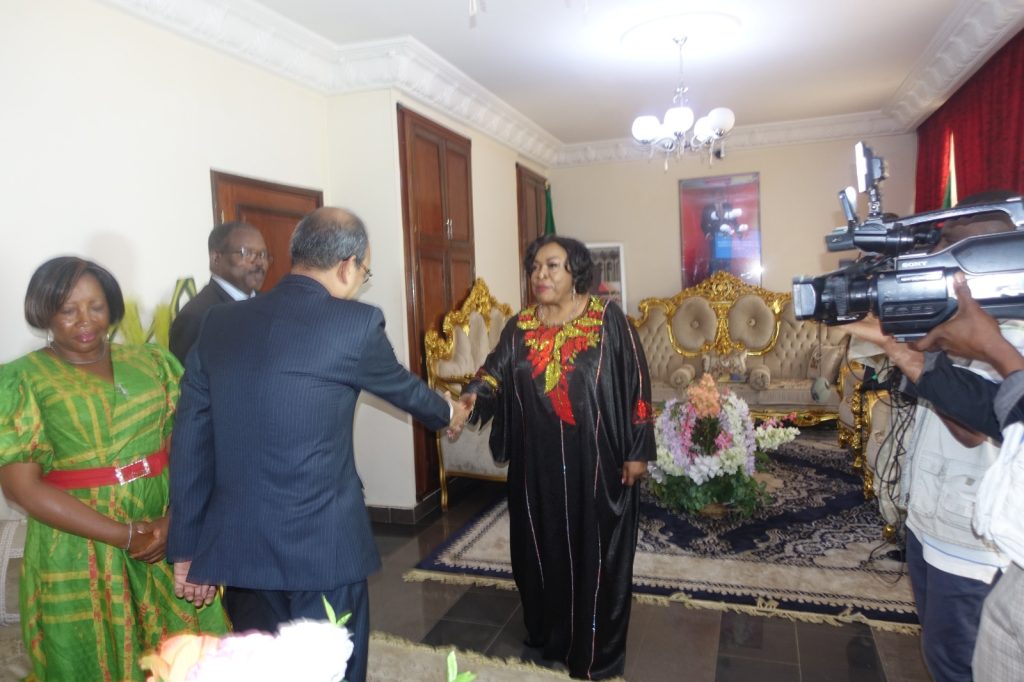THE MINISTER OF SCIENTIFIC RESEACH AND INNOVATION GRANTS AN AUDIENCE TO THE INDIAN HIGH COMMISSIONER TO CAMEROON

The Minister of Scientific Research and Innovation, Dr Madeleine TCHUINTE granted an audience to the Indian High Commissioner to Cameroon. At the end of his stay, the diplomat bid farewell after two years of fruitful cooperation with MINRESI.
On Wednesday 29 November 2023, the Minister of Scientific Research and Innovation, Dr Madeleine TCHUINTE, granted an audience to H.E. SHRI ANINDYA BANERJEE, Indian High Commissioner to Cameroon. This was a farewell visit marking the end of the Indian diplomat’s stay in Cameroon. It reflects the excellent cooperation between MINRESI and Indian High Commission.
India and Cameroon enjoy long-standing and excellent relations in several key areas, including scientific research and innovation. During his stay in Cameroon, the Indian High Commissioner to Cameroon and Minister for Scientific Research and Innovation, Dr Madeleine TCHUINTE, met on several occasions. On December 21, 2022, they met for an audience that focused on the India-Cameroon-Germany triangular project. The project, which concerned the transfer of agricultural technology known as Rooted Apical Cutting (RAC) technology, involved Bagalkot University in India, Agricultural Research Institute for Development (IRAD) in Cameroon and GIZ, German cooperation mechanism.
Rooted Apical Cutting (RAC) is a technique for producing potato seed using apical technology. This technology, developed in India, involves the mass production of seed potato through tissue culture. Cameroon is the second African country, modelled on Kenya, to benefit from this technology. As part of this project, a training workshop was organised in September 2022 in Bafoussam involving Indian experts. In October of the same year, IRAD researchers travelled to India to learn more about the said technology. IRAD then set up a project to produce potato seed using rooted apical cuttings (RAC), the pilot phase of which lasted 8 months. Hundreds of seed potato producers were trained in the use of the rooted apical cuttings technique. Cameroon’s objective is to reach a production level of 30,000 tonnes per year. Similarly, the Indian government is providing training grants to MINRESI researchers under the Indian Technical and Economic Cooperation (ITEC) scheme, with a view to build capacity in various fields.
This farewell audience was an opportunity for the Minister of Scientific Research and Innovation to express her gratitude to the Indian Government for its support in technology transfer between Cameroon and India. She also praised the strong involvement of H.E. SHRI ANINDYA BANERJEE who, during his stay in Cameroon, strengthened and diversified the scientific and technical cooperation between the two countries.
The Indian diplomat, who arrived in Cameroon on February 2022, said he was particularly pleased to learn that the triangular project on the transfer of apical technology for the production of seed potatoes had been a success in Cameroon. He added that his successor would continue in the same vein, with the possibility of extending this cooperation to other sectors. At the close of the audience, the Minister of Scientific Research and Innovation exchanged courtesies with the diplomat, wishing him success all through his career.
©Celtrad/MINRESI
